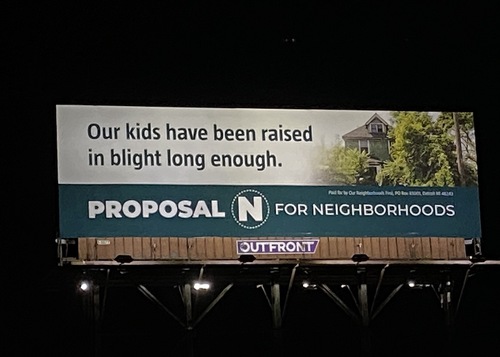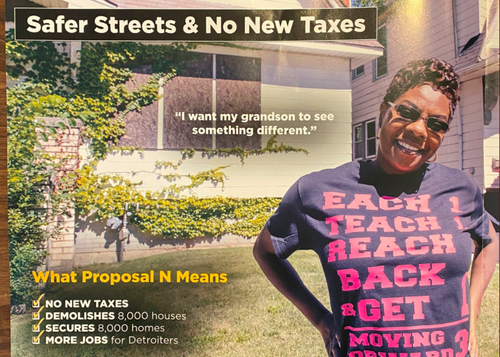
A Prop N billboard on 8 Mile, on Detroit's west side. (Photo: Violet Ikonomova)
Current and former appointees of Detroit Mayor Mike Duggan are behind a dark-money group pushing the mayor's controversial $250 million blight bond proposal.
Federal Communication Commission records show the nonprofit Our Neighborhoods First is run by Lorna Thomas, a dermatologist appointed by Duggan to the city's Public Lighting Authority in 2014, where she serves as chair, and Betty Brooks, who was appointed by Duggan to the Detroit Board of Police Commissioners in 2016 and whose term expired earlier this year.
The nonprofit has blitzed Detroiters with messaging some find misleading as Duggan seeks voter support for Prop N, his plan to knock down or preserve 16,000 of the city's estimated 22,000 abandoned houses. The group is believed to have spent hundreds of thousands of dollars on television and digital ads, mailers, texts, and billboards. As a 501(c)4, it is not required to disclose its donors.
A P.O. box listed on mailers for the group has previously been used by a PAC connected to the Detroit Regional Chamber of Commerce, which represents the interests of the business community and has backed Duggan’s past political initiatives.
The Our Neighborhoods First playbook mirrors that of a 2016 dark-money nonprofit that helped thwart a community benefits ballot proposal Duggan opposed. That group, Detroit Jobs First, was also run by a Duggan appointee and incorporated and aided by the same Lansing-based attorney and government compliance officer as Our Neighborhoods First — Dykema’s W. Alan Wilk and Renae Moore.
"If there was an interest in transparency from the supporters of Our Neighborhoods First, those parties could've easily created a ballot committee ... to advocate for the proposal,” said Simon D. Schuster, executive director of the non-partisan Michigan Campaign Finance Network, noting the group would not have had to limit its spending or fundraising. “The only difference is the public would eventually know where that money is coming from. Yet by choosing to avoid disclosing anything about their backers, we're left wondering who's or what's behind the curtain."
A spokesman for Duggan did not answer directly when asked whether the mayor or officials with his administration played any role in setting up the nonprofit. The spokesman, John Roach, said "members of the administration work with it where appropriate."
FCC filings also list Impact Church pastor Keenann Knox as a board member or officer of the group. He, Thomas and Brooks did not respond to messages seeking comment. Reached by phone for comment late last month for an initial version of this report, Wilk, the lawyer, said he was "not authorized to speak to the press on this."
It's unclear what connection any of the group's officers have to the city's decades-long fight against blight. Thomas, a native Detroiter, is an art collector who lives in a historic Palmer Woods mansion estimated to be worth about $700,000. She's primarily active in the city's cultural institutions, serving on the boards of the Michigan Opera Theatre, Detroit Institute of Arts, and Music Hall Center for the Performing Arts.
Brooks, the widow of a longtime GM executive, lives in Sherwood Forest, another affluent, blight-free neighborhood, and is also primarily involved with the city's arts organizations.
Knox's church is directly behind another property owned by Thomas, on the east side near Chandler Park. Property records indicate he lives in St. Clair Shores, where he owns a home designated as his principal residence for tax purposes.
Duggan goes back with both Thomas and Brooks. Thomas was on the Detroit Medical Center board when he was the hospital system's chief executive officer, and helped advise him as he embarked on his first mayoral campaign, in 2012. Meanwhile, Duggan has previously called Brooks a "dear friend" of "probably 30 years."

"No new taxes"?
The group's messaging says Prop N would demolish 8,000 homes and secure 8,000 more while creating jobs for Detroiters. It promises "safer neighborhoods for our families" and a less chaotic aesthetic for future generations.
More dubious is the additional claim that this will be done with "no new taxes," two recipients told Deadline Detroit. The proposed bond will levy 3.114 mills — or $3.114 per $1,000 of taxable value — in 2021, and an estimated average annual millage rate of 2.665 thereafter. That's a little over $50 per year for the average owner-occupied Detroit home, worth $19,000.
Billboard language also seems to suggest the proposal will mark an end to the city's blight problem, when it will leave an estimated 6,000 abandoned houses unaddressed and many of the 8,000 to be secured are expected to remain vacant for years.
Proponents of the proposal note that without the funds, demolitions in the city will all but come to a halt in the near term, as the city looks to bridge a massive budget gap resulting from the coronavirus.
But critics argue Detroiters should not be forced to take on an additional tax burden when they've not been repaid the collective $600 million a Detroit News investigation found they were overtaxed between 2010 and 2016.
"They have been using the neighborhoods as an ATM to finance people downtown," Lee Gaddis with the Bagley Community Council said in a late September conference call in opposition to Prop N, noting the hundreds of millions of dollars in breaks afforded to developers like Dan Gilbert and the Ilitch group. "So instead of them coming to us — people who’ve been historically overtaxed — asking for us for money, we need to reverse that currency flow and they need to tax the billionaires that have been leeching off our residents."
Others complain the revamped proposal — which builds off one that was rejected by city council last year — was rushed through council with ambiguous language surrounding its various goals, including the hiring of Detroiters. Detroit Charter Revision Commission vice-chair Nicole Small noted the proposal language refers only to a "goal" of having 50 percent or more of the work performed by Detroiters, and that similar efforts have previously failed, like in the case of the construction of the Little Caesars Arena.
Though it's unclear who is financing the campaign for the proposal, a post office box listed on a mailer that went to residents is connected to the Detroit Regional Chamber of Commerce, as reported in Deadline Detroit by Charlie LeDuff:
The P.O. box is also home to a super PAC known as Detroit Forward Together, which has in the past been funded by another super PAC called Powering the Economy, which is connected to the [chamber] and has a box in the same tower. Its contributors include multinational banks and wealthy regional Republicans. Calls to the treasurer of Detroit Forward Together – in the 517 area code – were not returned.
The address is also being used on campaign literature in support of three school board members seeking re-election.
Paperwork filed with the state lists an Ann Arbor address and "The Corporation Company" as a registered agent.
The website for Our Neighborhoods First, much like the one for Detroit Jobs First, was registered through a company called Domains By Proxy, whose tagline is: “Your identity is nobody’s business but ours.”


 by
by








